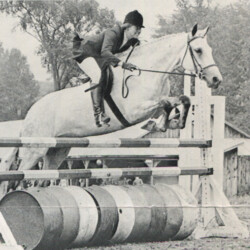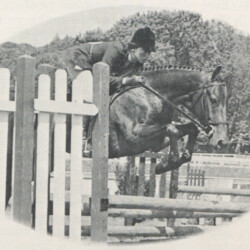1973-74 Winter Issue: Hideaway Farm’s Jackie Harris Writes Open Letter to ACPS Members
The 1973 Winter Issue (Vol. III, No. 4) of the American Connemara Pony Society News was eight pages.
Next meeting at Devon: The issue led off with the president’s message, again from Dorothy Lyons, saying the board of governors would meet May 26 at Devon. It didn’t say that it was in conjunction with the Devon Horse Show, in Devon, Pennsylvania, but the show was held each May, so probably. This gathering looked like a second meeting of the year, similar to the two-meeting schedule the ACPS has today, though the ACPS was not part of the AHSA/USEF at the time (it was trying to become a member breed), so the meeting was not tied to AHSA/USEF activities.
Competitor summary: There was a summary and photo of R.H.F. O’Harazan, of Rose Hill Farm, a 10-year-old, 15-2 hand mare by Tarzan out of Cullahara. (Note that she was registered in Stud Book IV as Rose Hill’s Oharazan.) She was purchased by Gilnocky Farm at age 6 in 1970. In 1973, she won the Junior Hunter Championship of Vermont after winning Junior Hunter Champion at all seven shows she competed in.
EIA outbreak: Apparently, equine infectious anemia, or swamp fever, was a big deal in 1973. The newsletter explained that Dr. Leroy Coggins, a former USDA scientist, had developed the Coggins test for the disease, and seven states required the test to move a horse across state lines, while 17 states required positive horses to be quarantined.
Outside material: A few stories were republished from other publications, likely to fill space.
Jackie Harris letter to ACPS members: And then there was this open letter from Hideaway Farm owner Jackie Harris from Jan. 22, 1974, as she ended her term as a governor of the ACPS. She and her husband had each served as president over the years.
Jan. 22, 1974
TO THE MEMBERS OF THE AMERICAN CONNEMARA PONY SOCIETY
At the end of this year, my term as governor of the American Connemara Pony Society expires. Before retiring, there are a few things that I would like to bring to your attention in the hope that the society will continue to do a good job for the wonderful Connemara.
My husband and I, during our respective terms as president of the society, had the opportunity of getting to know many of you and to appreciate the importance of the work of our little organization. There were many good and happy times and many difficult, if not downright desperate, times. We are, I can assure you, more than content to have others take on the responsibility for leadership. Our only desire is to be of such help as we can based on such experience and information we may have acquired over the years.
I think it most important that the society be at all times open to new ideas. Just because we have done something in a certain way for a certain period of time is insufficient reason in itself to continue the practice. Continual reexamination and carefully selected innovations are certainly desirable. On the other hand, it has been said that those who do not read history are condemned to repeat it, and the errors previously made and the pitfalls avoided should be carefully examined by the newer members as well as those of longer standing in order to chart a successful future course.
1) It seems to me most desirable in most circumstances for the society to be directed by the knowledgeable, small breeder rather than to accord too prominent a position to those who are primarily interested in the commercial aspects of Connemara breeding. The reason for this is obvious: If the society comes to be used for the benefit primarily of any individual and his business, disaster can be guaranteed.
2) It should be noted that particularly in a small, not-for-profit society, strong personalities with relatively little knowledge and experience can, perhaps inadvertently, work to the disadvantage of the objectives of the organization.
3) The membership and the board of directors must have the opportunity to come to know well and observe in action candidates for the board as well as officerships before they can be entrusted with the guiding of the destinies of the group.
4) Life is change, but change in our society should come only after careful consideration and after weighing carefully past experience. This is not to say that new approaches and new ideas should be stifled, but rather that proposals should be carefully weighed and considered and, where possible, tried out “in the laboratory” before being adopted by the membership or the board.
5) By-laws are not sacred and should from time to time be updated and amended. It should be re-membered, however, that they have been prepared after most careful consideration by those who have had considerable experience and are for the most part patterned after other successful organizations.
6) As membership in the society increases, broad geographical representation amongst members and board members, as well as officers, should be a society objective. There must always be room for, and careful attention paid to, the opinions and needs of the small breeder.
7) I rate the quality of true sportsmanship very high in the selection of any person connected with the society no matter in what capacity. We are not primarily a society of professionals but rather a group of people devoted to the improvement of the breed and the perpetuating of Connemara quality. We are, in the true sense, trustees for the future. Nothing should be allowed to obscure this basic concept or to mar enjoyment of our avocation.
We have come through some extraordinarily difficult times, but I believe the society will be proved to have been strengthened in the fire.
I do not know the origin of the following bit of philosophy, but it certainly applies to the American Connemara Pony Society. It is entitled, “The Wishbone’s Connected to the Backbone!”:
“In the anatomy of every organization, there are four kinds of bones: The ‘wishbones’ who spend their time wishing someone else would do the work; the ‘jawbones’ who do all the talking but very little else; the ‘knucklebones’ who knock everything that anyone tries to do; and the ‘backbones’ who get under the load and do the work!”
I feel I have learned a lot about people, motives and horses as a result of my association with the society, but no one has taught me more than the Connemara itself. Good luck and a good year to all of you!
Most cordially,
Jacqueline S. Harris
Gallery
Click a photo to enlarge it.

